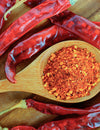
Measuring your ingredients might seem like a mundane task, but it holds the key to better cooking, more thoughtful eating, and less waste. Whether you're an amateur cook or a meal prep aficionado, weighing your food offers multiple advantages. Here's why this practice is especially beneficial for young families looking to enhance their culinary experiences and well-being.
Portion Control
Portion sizes can be tricky to judge by eye, and it's easy to overeat when you're not paying attention. For parents focused on mindful eating for themselves and their children, a food scale becomes a vital tool. When you weigh your food, you can determine precise servings based on dietary needs, whether it's limiting sugar intake or ensuring you get enough protein. Weighing your food is particularly useful when divvying up treats. Imagine you've just made a batch of cookies flavored with gourmet butter. To make sure each member of the family gets an equal share without going overboard, you can weigh each cookie to even out the portions. This practice helps foster healthy eating habits early on and ensures everyone gets their fair share of culinary delights.
Precision Cooking
Accuracy is paramount when it comes to following recipes, especially for dishes that require a delicate balance of ingredients. Using weight instead of volume when measuring ingredients often leads to better results. When you weigh your ingredients, you eliminate the guesswork involved in using measuring cups and spoons, which can be inconsistent due to factors like settling and packing. For recipes requiring precise ratios—such as bread, pastries, or sauces—a scale can make the difference between success and failure. A family weekend project to make croissants with a coconut butter filling, for instance, will be much more enjoyable if the pastry comes out as it should.
Avoid Waste
In today's world, where food waste is a growing concern, weighing your food can contribute to a more sustainable lifestyle. Knowing the exact amount of food you need helps you avoid over-purchasing, which not only saves money but also reduces waste. For example, if you're making a gourmet butter sauce and the recipe calls for 4 ounces, you can weigh out exactly that much, saving the rest for another meal. The practice extends beyond just cooking. If you're packing lunches for your children, weighing snacks and fruits ensures you're not putting too much or too little into their lunchboxes. Over time, this careful planning can significantly cut down on the food that ends up being thrown away.
Adopting the habit of weighing your food offers multiple advantages, from achieving the perfect balance in your recipes to promoting responsible consumption. For young families, these benefits can play a significant role in establishing a healthy, enjoyable, and sustainable approach to food. Whether you're trying to create a culinary masterpiece with artisan butter or simply packing a school lunch, a kitchen scale is an indispensable tool that aids in precision, prevents waste, and supports better eating habits.
Did You Enjoy Reading This Article? Here’s More to Read: What You Need to Know About Carbs







